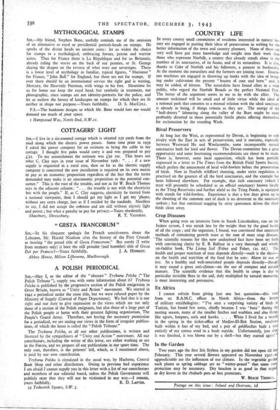COUNTRY LIFE
IN every county small committees of residents interested in natural his- tory are engaged in putting their ideas of preiervation in writing for the better information of the town and country_ planners. None of these can very well have put more knowledge and weight into their work than those who represent Norfolk, a county that already stands alone in the number of its sanctuaries, of its fauna, and of its naturalists. It is also, thanks to Coke of Norfolk and his followers, a pioneer in husbandry. At the moment the naturalists and the farmers are joining issue. Enorm- ous machines are engaged in throwing up banks with the idea of bring- ing under cultivation the present " haunts of coot and hem " and, it may be added, of bittern. The naturalists have found allies in a wide public, who regard the Norfolk Broads as the perfect National Park. The better of the argument seems to me to lie with the allies. The amount reclaimed will be small and of little virtue while the ideal of a national park that consents to a mutual relation with the ideal sanctuary is already in being, if things remain as they are. The energy of the "bull-dozers " labouring along the valley of the Bure might be more profitably diverted to those potentially fertile plains offering themselves for reclamation by the receding Wash.
Rival Preservers At long last the West, as represented by Devon, is beginning to seek rivalry- with the East in acts of preservation, and it contains, especially between Westward Ho and Woolacombe, some incomparable natural sanctuaries both for bird and flower. The Devon-committee has a great opportunity and some heartening recommendations are about to be made. There is, however, some local opposition, which has been partially expressed in a letter to The Times from the British Field Sports Society, which prefers the amusement of local wild-fowlers before the preservation of birds. Now in Norfolk wildfowl shooting, under strict regulation, is practised on the greatest of all the bird sanctuaries, and the example has been followed elsewhere. For example, that rich sanctuary (which I trust will presently be scheduled as an official sanctuary) known locally as the Tring Reservoirs and further afield as the Tring Ponds, is equipped with stands for wild-fowlers. Experience is that a few days given up to the shooting of the common sort of duck is no deterrent to the sanctuary seekers ; but that continual nagging by stray sportsmen drives the shyer birds clean away.
Crop Diseases When going over an intensive farm in South Lincolnshire, run on the Indore system, I was struck less by the weight than by the good health of all the crops ; and the organiser, I found, was convinced that unnatural methods of stimulating growth were at the root of most crop diseases. The scientific reasons for this now undoubted fact have been set forth with convincing clarity by E. B. Balfour in a very thorough and wholly un-faddist book, The Living Soil (Faber and Faber, izs. 6d.). The health and proper nutrition of man depends directly—such is the thesis— on the health and nutrition of the food that he eats : Mann in was a isst. So a healthy and well-nourished people depends directly—though it may sound a gross anti-climax—on the use of compost and natural manure. The scientific evidence that this health in crops is due to particular invisible flora in the soil, duly multiplied by natural manuring, is most interesting and persuasive.
Ex Africa .
I cannot refrain from giving just one last quotation—this time from an R.A.M.C. officer in North Africa—from the letters of military ornithologists : " I've seen a surprising variety of birds in Tunisia, but found few nests, chiefly because I was `busy' during the nesting season, many of the smaller finches and warblers and also things like egrets, hoopoes, owls and hawks. . . . When I lived for a month in the spring in the ticket-office of Medjez-El-Bab Station, swallows built within 6 feet of my bed, and a pair of goldfinches built a nest entirely of my cotton wool in a bush outside. Unfortunately, just after it was finished, it was blown out by a shell—but they started again! "
In the Garden
Two years ago the first Iris Stylosa in my garden did not open till late February. This year several flowers appeared on November 23rd--so uppredictable are the influences of our climate. In the vegetable garden such plants as spring cabbage are so " winter-proud " that some extra protection may be necessary. Dry bracken is as good in that regard as dry leaves in the rhubarb pots or box protectors.
W. BEACH THOMAS.
Postage on this issue : Inland and Overseas, td.


























 Previous page
Previous page